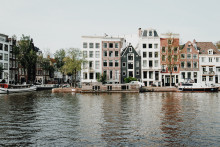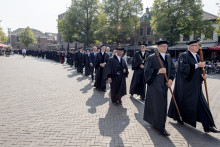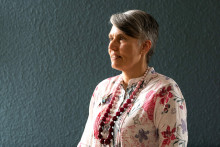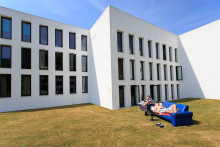CATCH, which stands for 'water sensitive Cities: the Answer To CHallenges of extreme weather events', is a three-year Interreg project that started in 2017 and involves twelve European partners along with the UT. It focuses on making midsize cities in the North Sea Region climate resilient. This also includes cities in the province of Overijssel, where two of the project’s pilots are being implemented: one in Zwolle and one in Enschede.
More green areas, less floods
The city of Enschede is working on the City Brook (Stadsbeek) project at the Pinkeltjesplein (Pinkeltjes Square). The square will become a playing area for children but also function as a water storage area during heavy rainfall. ‘Many neighborhoods in Enschede, including this one, have problems with high ground water levels,’ says Gül Özerol, researcher in charge of CATCH on behalf of the UT. ‘If it rains heavily, many houses get flooded. The goal of the Enschede pilot is therefore to redesign the square, create more green areas and consequently store more water, which prevents flooding of streets and houses.’
Özerol explains that such pilots are essential for developing new regulations and water management tools. ‘At the moment, it’s not clear who is responsible for dealing with the impacts of climate change. These pilot projects will address this issue and also raise awareness about it. For instance, the municipalities involved in CATCH work with housing corporations and building companies, and develop practical measures with them, like that they shouldn’t use tiles in gardens anymore, but have green gardens instead.’
Adapting to the changing climate
North Sea Region is the focal point of CATCH. ‘As the rest of the world, the region is experiencing a changing climate. Specifically, there is often too much rainfall in a very short amount of time. The rain has nowhere to go in cities, because they are covered with asphalt and concrete,’ clarifies Özerol. ‘That is why we need to change the design of urban areas, and adopt a water sensitive approach to create resilient cities.’
‘The ultimate goal of CATCH is for each city to develop its own climate adaptation strategy,’ adds the UT researcher. Hopefully the local governments will be able to do that with the help of an interactive online tool, which the UT and other CATCH partners are developing. ‘On top of leading the work package focused on the needs assessment of pilot cities, our department CSTM (UT Department of Governance and Technology for Sustainability), is also contributing to the development of this decision support tool, which will then be tested and used by the pilot cities.’







